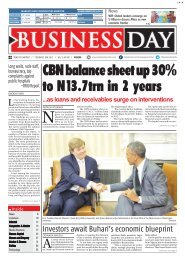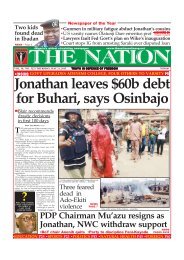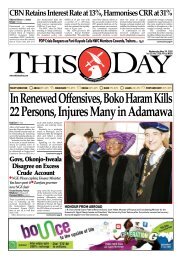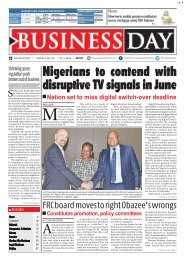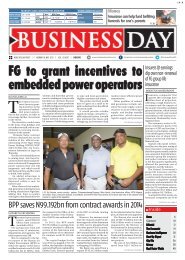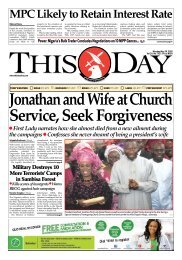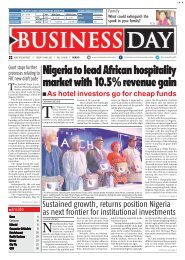You also want an ePaper? Increase the reach of your titles
YUMPU automatically turns print PDFs into web optimized ePapers that Google loves.
THISDAY • MONDAY, MAY 18, 2015<br />
POLITICS/ THE MONDAY DISCOURSE<br />
21<br />
PLATEAU’S PEACE OF THE GRAVEYARD<br />
Residents fleeeing a Jos community in aftermath of incessant attacks<br />
Much of the violence on<br />
the state has resulted<br />
largely from ignorance<br />
and illiteracy. The fact<br />
is that a substantial<br />
population of Nigerians<br />
are still illiterate, which<br />
makes them easy vessels<br />
of manipulation by<br />
unpatriotic elites. This is<br />
very much the case in Jos<br />
tificates and therefore decide the indigene<br />
status of anyone. This arrangement opened<br />
the floodgates for the politics of labelling and<br />
the selective reciting of historical accounts that<br />
foster group boundaries to secure political<br />
control over local government areas.<br />
In a socio-political environment characterised<br />
by strong patronage networks, exclusion<br />
of one fraction of the political elite is widely<br />
felt as socio-economic decline among its<br />
constituency. The urban conflicts dynamics<br />
interlink with tensions in rural areas. The<br />
increasing scarcity of land and access to<br />
riverbanks has resulted in contested claims<br />
over land use between indigene farmers<br />
and Fulani herders.<br />
Religion reinforces the boundaries between<br />
the mostly Christian indigenes and the<br />
Muslim Hausa and Fulani in both urban<br />
and rural conflicts.<br />
In principle, these root causes of the<br />
conflicts are well understood. Nigeria has<br />
elaborated severally on the problem of<br />
indigene rights at several fora and even at<br />
the National Assembly. Yet there has been<br />
a poor political will to address the problem.<br />
The escalation of large-scale urban and rural<br />
violence over the past decade contributed<br />
to the protracted conflicts.<br />
Compounding the tragedy of the Jos crisis,<br />
violent clashes are no longer sparked only by<br />
deliberate political instigation during election<br />
times. In fact, Plateau State remained calm<br />
during the April 2011 and 2015 national and<br />
gubernatorial elections.<br />
But small-scale reprisal and revenge killings<br />
have continued to explode since 2010, even<br />
in the villages. The situation is so tense that<br />
residents fear that any minor incident could<br />
set the town ablaze again. It gives credence<br />
Jang...did his best<br />
to the belief that their some external forces<br />
on standby waiting to unleash terror at the<br />
slightest provocation.<br />
What is obtainable in Jos can therefore<br />
not be described as peace yet. A long-term<br />
solution to the Jos and wider Plateau State<br />
crisis will need to tackle the indigene-settler<br />
divide. However, given that the conflict over<br />
indigene rights is endemic all over Nigeria,<br />
Plateau State will hardly arrive at a durable<br />
solution on its own.<br />
Christian indigenes need only point to the<br />
discrimination against fellow Christians in<br />
northern, predominantly Muslim states to<br />
justify exclusion of the Hausa-Fulani in Jos.<br />
The latter, however, constitutes Nigeria’s most<br />
populous ethnic nationality. Thus, Plateau<br />
indigenes feel threatened with marginalisation<br />
and are not willing to be the first to step<br />
down from exclusive indigene privileges.<br />
Religious leaders will have to take responsibility<br />
for invalidating the perceptions of the<br />
threat to religious identity that have become<br />
entrenched in the daily lives of the people<br />
in the state.<br />
Top-level religious leaders have preached<br />
peace and tolerance, but the message has<br />
neither yielded nor reached those meant for.<br />
While grassroots initiatives echo their tenor,<br />
mid-level religious leaders feel the pressure<br />
to protect their communities. People tend<br />
to be suspicious of inter-religious dialogue,<br />
making it difficult to rebuild trust among<br />
communities.<br />
Several dialogue and peace meetings have<br />
been held to reconcile the various divides,<br />
but most of them only ended up in empty<br />
agreements and promises to sheathe swords;<br />
they soon resume violence at the slightest<br />
provocation.<br />
The outgoing administration of Governor<br />
Jonah Jang has particularly done much in this<br />
regard. Special Adviser to the Governor on<br />
Peace Building, Mr. Timothy Parlong, had on<br />
several occasions collaborated with groups<br />
to bring back peace in the state.<br />
The Governor had also strengthened<br />
Plateau Peace Conference, which was aimed<br />
at bringing all the people together with a view<br />
to addressing their grievances and charting a<br />
common course. But it never really worked.<br />
Jang also appointed Special Advisers from<br />
the various tribes in the state, including the<br />
Hausa-Fulani, thinking that their inclusion<br />
in government could render useful ideas<br />
towards finding a lasting solution. It also<br />
failed.<br />
He also established a state-sponsored<br />
security outfit, the Operation Rainbow, a<br />
neighbourhood watchdog to cub the incessant<br />
killings – still to no avail.<br />
The Senator Representing Plateau North<br />
zone in the National Assembly, Gyang Pwajok,<br />
also exerted a lot of energy trying to reconcile<br />
the people. He has to his credit as a major<br />
player in the much that has been achieved<br />
in reconciling the Hausa community in Jos<br />
with the indigenes. He had on several occasions<br />
visited the Jos Central Mosque and<br />
the Churches to dialogue with the religious<br />
leaders.<br />
At his instance, peace meetings have<br />
severally been held among traditional<br />
leaders. Football match competitions have<br />
been organised at his instance on different<br />
occasions, and empowerment. But in spite<br />
of these laudable efforts, political watchers<br />
have emphatically said both the state and<br />
federal governments have no political will<br />
to end the crisis.<br />
They posited that if they really do, they<br />
would not have been reluctant to implementing<br />
the White Papers of the various<br />
recommendations by the different commissions<br />
of inquiries that indicted several ‘sacred<br />
cows’. They added that as long as these<br />
heavy recommendations of the commissions<br />
of inquiry and the Presidential Advisory<br />
Committee on the crisis, including various<br />
white papers are forced under the carpet,<br />
the resolution of the crisis would remain<br />
a mirage.<br />
Indeed, there have been several commissions<br />
and strategies set up to study the causes of<br />
violent identity conflicts in Jos and proffer<br />
workable solutions. Unfortunately, until the<br />
present moment, government’s responses<br />
to the conflicts are widely “perceived as<br />
ineffective”<br />
At least, 16 public commissions have been<br />
launched to examine the conflict and identify<br />
solutions and many other studies have been<br />
conducted by independent groups. There is<br />
little political will to act on these findings.<br />
Federal and State governments have<br />
regularly worked at cross-purposes, sharply<br />
disagreeing on the measures to mitigate<br />
conflict in Jos, while the involvement of<br />
civil society groups has more or less had<br />
a polarising effect in most cases.<br />
In the aftermath of the 1994 crisis, a sevenmember<br />
judicial commission of enquiring<br />
headed by Justice Aribiton Fiberesime<br />
(Rtd) was constituted by the then military<br />
administrator of the state, to look into the<br />
causes as well as possible solutions to the<br />
crisis. However, the report of that commission<br />
CONT’D ON NEXT PAGE



